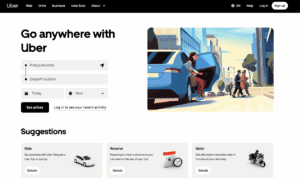Domain Privacy and Protection: How and Why to Hide WHOIS Information
If you don’t tread carefully, anyone in the world can find out who bought the web address you just snapped up. Domain name expert Joe Uddeme shares his top tips for staying out of the limelight. In the rush of excitement that comes with securing a name – especially a desirable, premium domain name you’ve been after – it’s easy to overlook one of the most basic elements of name registration: shielding your identity. Millions of people before you have forgotten to do it – precisely because it is so easy to overlook. Or perhaps you spotted the option to stay anonymous but didn’t quite understand what it meant – or felt it wasn’t worth the cost. Here’s how to stay out of the WHOIS database when buying a domain name – and why you might want to. Key takeaways: Understanding your Domain Privacy options Discover which countries keep your name secret by default The benefits of keeping your information private How to ensure your name stays out of the picture Discover Domain Privacy FAQs What Is Domain Privacy? Domain privacy is a service domain registrars offer customers to hide their information from the public WHOIS database. Customers pay for privacy from their registrar, which replaces their contact information in the WHOIS database with a forwarding address. What Does Domain Privacy and Protection Do? It removes a domain owner’s information from the public WHOIS database and preserves their privacy. The WHOIS database is a vast database operated by the Internet Corporation for Assigned Names and Numbers (ICANN). ICANN is the agency that oversees domain names, and every individual or company that buys a domain name must provide their contact information to this agency. ICANN, in turn, lists all contact information in a public database called WHOIS. Anyone can search the WHOIS database to get the contact information of a domain’s owner. Many owners are uncomfortable with their contact information being listed publicly, so they pay their domain registrars for domain privacy and protection. The registrar replaces the customer’s contact information with a forwarding or proxy address on the WHOIS database, so people can’t look up the real contact details. Do I Need Domain Privacy? You need to pay for privacy protection if you’re uncomfortable with your email address or phone number being posted online. Many spammers and telemarketers scour the WHOIS database for the contact information of domain owners to sell them products. Domain name privacy protection prevents this from happening. People residing within the European Union (EU) don’t need to pay for domain privacy because they get it by default. On 25 May 2018, the EU passed the General Data Protection Regulation (GDPR) ruling. This ruling mandated companies serving EU residents to give customers control over their data. EU customers were granted strict data privacy under this law, so domain registrars began hiding their information from the WHOIS database by default. Many other countries have passed laws similar to GDPR, such as Turkey, South Korea, Argentina, and Brazil. The United Kingdom (UK), a former EU member, also passed a similar law. You may not need to purchase a domain name private registration if you reside in these countries. However, customers in other countries need domain privacy and protection to hide their contact information. How Important Is Domain Protection? It is important because it lets you hide your contact information from the public view. Without this protection, your personal information will be available to anyone who wishes to find it, and malicious actors may take advantage of this freedom to target you with cyberattacks and domain name scams. Benefits Of Privacy Protection 1. Protects Personal Information Buying privacy protection when registering a domain removes your personal information from the public eye. People won’t be able to find your contact information by looking up your domain name on the WHOIS database. Instead, they’ll see the contact information of your domain registrar, which they can’t trace back to you. 2. Minimizes and Prevents Spam Spam is the biggest problem on the internet. It refers to any irrelevant and solicited message sent over the internet, usually to advertise products or steal information via phishing. Spammers search every possible medium to harvest emails and phone numbers, including the WHOIS database. Domain protection hides your details from this database so spammers can not target you with unsolicited messages. 3. Anonymity Many people are uncomfortable with their personal information being on the internet for whatever reason. Domain privacy and protection grants you anonymity even when you control many domain names. 4. Prevents Competitive Data Mining Businesses often mine public databases for information about their competitors. For example, if you run a popular blog anonymously, rival blogs may want to discover your identity and research potentially damaging information about you. Domain privacy and protection ensures that competitors can’t trace your identity through your domain name. 5. Prevents Domain Theft Hackers often target owners of valuable domain names with phishing messages to steal their registrar login details. They do this by sending a link to a website that looks exactly like your domain registrar’s page but is actually a different web address. The end game is to log into the owner’s registrar with the stolen details and transfer their domain name to another account. Purchasing domain privacy means that hackers won’t find your contact information in the first place. You can hold onto your valuable domain names without fear of being targeted by sophisticated cybercriminals. (Check out our post about what to do if you lose your domain name). How To Get Domain Privacy And Protection When Buying a Domain Most registrars display the option to add privacy protection to your cart when you choose to buy a domain name. It’s an effective method of upselling because they know many customers want privacy. Look for “hide WHOIS information,” “domain privacy,” “domain protection,” or a similar phrase on the domain registration box and select it. Head to the checkout page and pay for the registration, privacy protection, and any other item you selected. After paying, you’ll automatically have WHOIS protection for your new domain. Add To An Existing Domain You can always buy privacy protection for a domain name you already own. Follow these steps; Log into your domain registrar account. Head to the domain management section. Click on the specific domain name you need privacy for. Open the Security tab, and you’ll likely find a button that prompts you to buy WHOIS protection. Click on the button and proceed to your checkout page to pay. Wait for some time after the payment confirmation for your registrar to update the WHOIS database information. There are dozens of domain registrars, and the steps to add privacy protection to an existing domain are similar to what we explained above for each of them. FAQs on Domain Privacy Should I add privacy protection when buying and selling domains? Yes, you should add the option to hide domain registration info because it has many benefits. It prevents spam, competitive data mining, and potential domain theft. It also guarantees anonymity on the WHOIS database, which is desirable for privacy-conscious customers. If you are working with multiple domain names, especially high-value ones, an experienced domain consultant can ensure all of this is taken care of on your behalf. How Do You Buy A Domain With Privacy Protection You’ll usually see an option to buy privacy protection on the page where you search for an available domain. Add the privacy protection item to your cart alongside the domain name and pay, and you have successfully acquired privacy protection for your new domain. Is privacy protection available on all domains? It’s available for most domains, but there are some exceptions due to government rules. These include .US., .CA, and .FR, among others. Is there a cost to domain privacy and protection? Most registrars charge between $10 and $20 annually for privacy protection while registering a domain. However, a few offer it for free, e.g., NameCheap. About the author Joe Uddeme is Director and Principal of Name Experts, one of the world’s leading domain name brokerage services. He has overseen domain name sales and acquisitions totaling more than $150 million and is renowned worldwide as a go-to expert in buying and selling premium domains. Need help? Contact us at: [email protected]







